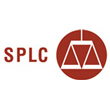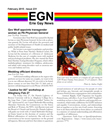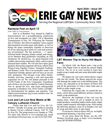Decision Overturning Alabama's Same-Sex Marriage Ban a Victory for Families, Children of Same-Sex Couples
MONTGOMERY, Ala - January 23, 2015. – A federal judge's ruling striking down Alabama's same-sex marriage ban as unconstitutional will provide greater stability to the lives of same-sex couples and their children, but more work remains to eliminate anti-LGBT discrimination in the state, the Southern Poverty Law Center (SPLC) announced today.
The judge in Mobile, Alabama, issued the ruling today in a case brought by two women seeking to have their marriage from California recognized. Cari Searcy and Kim McKeand needed the recognition so that both women could be recognized as legal parents of the child they conceived with the help of a sperm donor.
"This historic ruling is a giant step toward full equality for LGBT people in Alabama and does not harm anyone," said David Dinielli, deputy legal director for the SPLC's LGBT Rights Project. "It is a victory for Alabama families and the children of same-sex couples whose lives will have more stability and certainty now that they are afforded the same rights and privileges as other married couples."
Alabama's Marriage Protection Act, a law banning the recognition of same-sex marriages from other states, and the Sanctity of Marriage Amendment, which elevated the ban into the state's constitution, prevented the recognition.
The same ban is at the center of an SPLC lawsuit filed in December 2013 on behalf of Paul Hard, an Alabama man who had married in Massachusetts and afterward lost his husband, David Fancher, to an automobile crash.
It prohibited recognition of the marriage, precluding Hard from receiving any proceeds from a wrongful death lawsuit even though Hard was the sole beneficiary in Fancher's will. The marriage law also resulted in Fancher's death certificate stating that he was "never married."
"I am happy that justice has been won for same-sex couples across this state today," Hard said. "I am especially happy for Cari Searcy and Kim McKeand, the couple at the center of the case that resulted in this great ruling. I understand how painful it can be for the state to tell you that your marriage is inferior in the eyes of the law. I am elated that other couples will no longer feel that pain. There is still a long road ahead for total equality of LGBT people, but this is a moment to celebrate."
Hard's suit, which is still pending, also seeks for him to receive his rightful share of proceeds from a wrongful death suit and a corrected death certificate for his deceased husband that lists Hard as the surviving spouse. A judge has yet to rule on motions for summary judgment. The case is in the U.S. District Court for the Middle District of Alabama.
Hard and Fancher were married in Massachusetts in May 2011 but lived in Alabama. Fancher died the following August after an early morning car crash. When Hard arrived at the hospital in Prattville, an attendant refused to give him any information about Fancher or let Hard see his husband. Hard was told he was not a member of his husband's "family" and that gay marriages weren't recognized in Alabama.
After a half hour of inquiries, a hospital orderly finally told Hard, "Well, he's dead."
A wrongful death lawsuit was filed against the trucking companies involved in the wreck. Fancher had collided in the dark with a large truck strewn across the northbound lanes of Interstate 65 just north of Montgomery.
In Alabama, proceeds from a wrongful death case must be distributed pursuant to the laws of intestate succession (even though Fancher died with a will naming Hard as the sole beneficiary). Since Alabama refused to recognize lawful same-sex marriages from other states, it meant that Hard could not be deemed the surviving spouse and share in any proceeds that might be awarded.
Despite today's ruling, the end of the same-sex marriage ban does not mark the end of legal obstacles facing Alabama's LGBT community.
"More work remains on behalf of LGBT people," Dinielli said. "They still face discrimination in the Deep South, including formal discrimination enshrined in the law. It is still a felony in Alabama for LGBT people to have sex. Teachers in Alabama are still required to teach that homosexuality is immoral and illegal. And, of course, there is the private discrimination that LGBT people face every day, but the law fails to prevent."
The Southern Poverty Law Center, based in Alabama with offices in Florida, Georgia, Louisiana and Mississippi, is a nonprofit civil rights organization dedicated to fighting hate and bigotry, and to seeking justice for the most vulnerable members of society. For more information, see www.splcenter.org.



